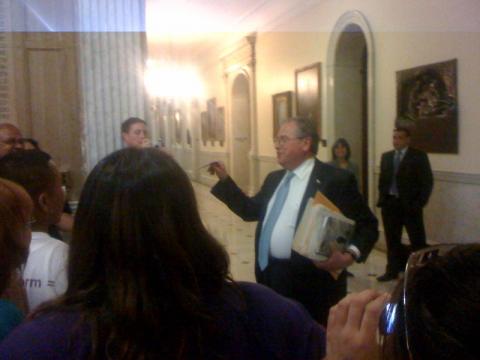
CORI Reform Clears House
BOSTON/State House - In a resounding majority vote of 139 to 17, the Massachusetts House of Representatives passed a much anticipated bill late Wednesday to reform the state’s criminal record system—known as CORI. The comprehensive reforms followed the Senate’s passage of a similar crime bill last November.
The bills are now sent to Conference Committee where the House and Senate versions will be merged before reaching the Governor’s desk for signing. Governor Patrick has promoted CORI as a top priority and released a statement Wednesday night that he "looks forward to working with the House and Senate to get a strong bill on his desk."
“This is a major victory for communities across the Commonwealth who will benefit from increased employment access, improved safety in our communities and less reliance on costly social services,” said Aaron Tanaka, Executive Director of the Boston Workers’ Alliance, a grassroots group that has helped lead the organizing effort since 2005.
Boston Police Commissioner Ed Davis called CORI reform “smart on crime,” and a “win/win that will improve public safety…and reduce the numbers of victims in the Commonwealth.”
CORI proposals underwent several redrafts starting in the 2007-08 session to build a broad based consensus reflected in the dominant vote. The Senate bill, mirrored by the House proposal, received notable acclaim from statewide groups including the Associated Industries of Massachusetts, the Massachusetts Major City Chiefs Association, the Massachusetts Sheriff’s Association and the Massachusetts Bar Association.
The CORI provisions included in both House and Senate versions included a “Ban the Box” proposal that would remove the CORI question from initial job applications. The proposal retains employers’ right to ask about a criminal history, but delays the timing of the inquiry so applicants are considered for their qualifications before being screened for a record. This policy was pioneered in Boston for public jobs in 2005, and has since been adopted in some of the largest cities across the country including Chicago, San Francisco and Austin. Most recently, Minnesota and New Mexico both passed “Ban the Box” laws for all state public jobs, while Massachusetts is poised to become the first state to remove the CORI question for all employers.
Additional reforms would reduce the length of time that old records are available. Currently, felony records are available for 15 years and misdemeanors are open for 10. The House proposals would reduce those periods to 10 and 5 respectively, excluding sex offenses and convictions for murder or manslaughter. Employers that work with vulnerable populations such as children, elderly and the disabled, as well as banking and financial institutions, would be exempt from these changes.
Speaker DeLeo greeted a cheering crowd of CORI advocates outside the House chamber after the vote. DeLeo declared that the vote was “an example of government working for the people” and emphasized that the bill would help those who have stayed free of crime to get a second chance and become productive taxpaying residents. The bill is expected to clear Conference Committee without major controversy, and must be signed into law by the Governor before the end of July when the 2010 formal session concludes.

